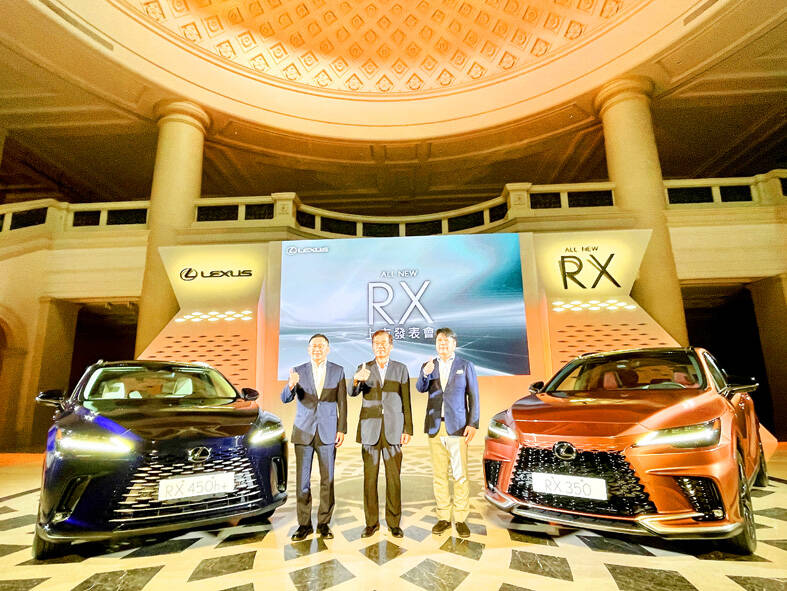New vehicle sales last month soared 35 percent year-on-year to 33,819 units, driven mainly by robust sales of luxury cars, data by market researcher U-Car showed yesterday.
On a monthly basis, new vehicles sales contracted 5.7 percent last month, the data showed.
Hotai Motor Co (和泰汽車), which distributes Lexus and Toyota models in Taiwan, said Lexus sales jumped 58.3 percent annually to 2,870 units last month, making it the best-selling luxury car brand last month.

Photo: Amy Yang, Taipei Times
“Overall, some imported vehicle brands posted sales increases, thanks to the arrival of new vehicles. That gave a boost to overall sales of imported vehicles,” U-Car said.
“Bolstered by Lexus’ robust sales of 2,870 units, overall imported vehicle sales expanded 1.6 percent month-on-month, outpacing sales of locally made vehicles,” it said.
Sales of domestically manufactured vehicles contracted 12.9 percent month-on-month, but rose 25.2 percent annually to 12,726 units last month, while sales of imported vehicles surged 49.2 percent year-on-year to 14,253 units.
With consumer confidence recovering, Hotai said it expects new vehicle sales to expand to 40,000 units this month, up 1 percent from a year earlier, or 18.3 percent from last month.
Government subsidies to help consumers buy new models with lower carbon emissions would help fuel replacement demand, Hotai said.
Affected by component shortages, sales of Toyota vehicles last month retreated 32.4 percent sequentially to 8,018 units, Hotai said.
However, aided by Lexus’ outperformance, the company still held 33 percent of the domestic market, U-Car data showed.
Honda Taiwan Co (台灣本田) reported that sales soared 34 percent year-on-year and 33 percent month-on-month to 2,265 units last month, benefiting from improved supplies of chips and other components, U-Car said.
Hyundai Motor Co also saw a positive impact from an easing of the component crunch.
Nan Yang Industries Co (南陽實業), which distributes Hyundai vehicles in Taiwan, saw sales rise 4.5 percent to 1,711 units last month from January, or 71.4 percent from a year earlier, U-Car data showed.

The US dollar was trading at NT$29.7 at 10am today on the Taipei Foreign Exchange, as the New Taiwan dollar gained NT$1.364 from the previous close last week. The NT dollar continued to rise today, after surging 3.07 percent on Friday. After opening at NT$30.91, the NT dollar gained more than NT$1 in just 15 minutes, briefly passing the NT$30 mark. Before the US Department of the Treasury's semi-annual currency report came out, expectations that the NT dollar would keep rising were already building. The NT dollar on Friday closed at NT$31.064, up by NT$0.953 — a 3.07 percent single-day gain. Today,

‘SHORT TERM’: The local currency would likely remain strong in the near term, driven by anticipated US trade pressure, capital inflows and expectations of a US Fed rate cut The US dollar is expected to fall below NT$30 in the near term, as traders anticipate increased pressure from Washington for Taiwan to allow the New Taiwan dollar to appreciate, Cathay United Bank (國泰世華銀行) chief economist Lin Chi-chao (林啟超) said. Following a sharp drop in the greenback against the NT dollar on Friday, Lin told the Central News Agency that the local currency is likely to remain strong in the short term, driven in part by market psychology surrounding anticipated US policy pressure. On Friday, the US dollar fell NT$0.953, or 3.07 percent, closing at NT$31.064 — its lowest level since Jan.

The New Taiwan dollar and Taiwanese stocks surged on signs that trade tensions between the world’s top two economies might start easing and as US tech earnings boosted the outlook of the nation’s semiconductor exports. The NT dollar strengthened as much as 3.8 percent versus the US dollar to 30.815, the biggest intraday gain since January 2011, closing at NT$31.064. The benchmark TAIEX jumped 2.73 percent to outperform the region’s equity gauges. Outlook for global trade improved after China said it is assessing possible trade talks with the US, providing a boost for the nation’s currency and shares. As the NT dollar

The Financial Supervisory Commission (FSC) yesterday met with some of the nation’s largest insurance companies as a skyrocketing New Taiwan dollar piles pressure on their hundreds of billions of dollars in US bond investments. The commission has asked some life insurance firms, among the biggest Asian holders of US debt, to discuss how the rapidly strengthening NT dollar has impacted their operations, people familiar with the matter said. The meeting took place as the NT dollar jumped as much as 5 percent yesterday, its biggest intraday gain in more than three decades. The local currency surged as exporters rushed to